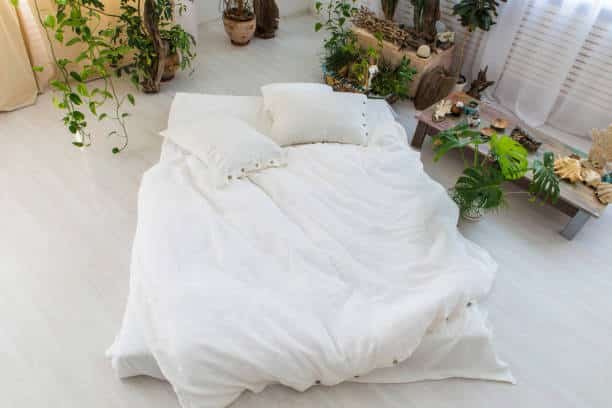The Ultimate Guide to Eco-Friendly Bedding
In recent years, eco-friendly bedding has become increasingly popular. This is because the current state of the environment is in dire need of attention, and it’s time for us to make a change. Eco-friendly bedding is one way we can make a positive impact on the environment, while also providing ourselves with a comfortable and healthy night’s sleep.
Moreover, as we become increasingly aware of our impact on the planet, more and more people are seeking ways to live in an eco-friendly way. Making sustainable choices within the home is a great place to start, and one way to do this is through our bedding. From sheets and duvets, to pillows and mattress toppers, there are a variety of eco-friendly bedding options available that can help reduce our impact on the environment. But with so many options on the market, choosing the right eco-friendly bedding can be overwhelming. That’s why we’ve created the ultimate guide to eco-friendly bedding.
In this guide, we’ll explore the various materials that eco-friendly bedding is made from, such as organic cotton, bamboo, linen, and Tencel. We’ll delve into the benefits of each material and why they are sustainable choices. We’ll also discuss how to choose the right bedding that meets your individual needs, such as those with allergies or hot sleepers.

1. Consider organic fabrics
Eco-Friendly Bedding is an important consideration for anyone looking to reduce their environmental impact. When it comes to choosing the right bedding materials, one key factor to consider is whether the fabrics are organic. Organic fabrics, such as cotton and linen, are grown without the use of synthetic fertilizers, pesticides, or herbicides, which can damage the environment and harm wildlife. Choosing organic fabrics can also help to promote sustainable farming practices and support local communities. Additionally, organic fabrics tend to be more breathable and hypoallergenic, which can lead to a more comfortable and restful night’s sleep. So, if you’re looking to make your bedding more eco-friendly, consider opting for organic fabrics whenever possible.
2. Look for third-party certifications
Look for third-party certifications when purchasing Eco-Friendly Bedding. Third-party certifications authenticate the environmental and social claims made by a product or brand. These certifications help consumers identify and make informed choices about eco-friendly products. Some common third-party certifications for Eco-Friendly Bedding include Global Organic Textile Standard (GOTS), OEKO-TEX Standard 100, and Forest Stewardship Council (FSC) certification. GOTS ensures that products are made from organic materials without the use of pesticides or harmful chemicals. OEKO-TEX Standard 100 certifies that products meet strict safety and environmental standards. FSC certification guarantees that products come from sustainably managed forests. By looking for third-party certifications, you can be confident that the Eco-Friendly Bedding you purchase is truly environmentally and socially responsible.
3. Invest in natural fibers
Investing in natural fibers can be a great way to make eco-friendly bedding choices. Organic cotton, bamboo, hemp, linen, and wool are some popular options that are all biodegradable, renewable, and sustainable. These fibers are grown without the use of harmful synthetic fertilizers or pesticides that can have negative impacts on the environment and the health of farmers. Also, natural fibers are breathable, hypoallergenic and can help regulate body temperature, making them comfortable choices for bedding. When shopping for bedding, look for certifications like Global Organic Textile Standard (GOTS), OEKO-TEX Standard 100, and Forest Stewardship Council (FSC) that ensure the product meets certain environmental and social standards. Investing in bedding made of natural fibers not only helps reduce landfill waste but also contributes to improving soil quality, conserving water, and mitigating climate change.
4. Buy from sustainable brands
Eco-friendly bedding has become increasingly popular as people become more aware of the impact their choices have on the environment. One important aspect of environmentally conscious bedding is choosing to buy from sustainable brands. These are companies that prioritize using sustainable materials, producing products in an ethical manner, and minimizing their overall environmental footprint. When shopping for eco-friendly bedding, look for brands that use organic materials, such as cotton or bamboo, and opt for manufacturing processes that avoid harmful chemicals and excess waste. By purchasing from sustainable brands, you are not only making a positive impact on the environment, but also supporting companies that offer high-quality, durable products that will last you for years to come.
5. Look for fair trade certified products
When it comes to purchasing eco-friendly bedding, one important factor to consider is whether the products are fair trade certified. This certification ensures that the manufacturer did not exploit their workers and that the production process meets strict social and environment standards. By choosing fair trade certified bedding, you are supporting the ethical treatment of workers and promoting sustainable practices that minimize harm to the environment. It’s a win-win situation – you get to enjoy high-quality, organic bedding while supporting a noble cause. When shopping for eco-friendly bedding, always look for the fair trade certified label on the product to ensure that your purchase aligns with your values.
Conclusion
All in all, switching to eco-friendly bedding may seem like a small step, but collectively it can make a significant impact on our planet’s health. With the vast array of eco-friendly bedding options available, it has become increasingly effortless to make the change. Making conscious decisions such as investing in organic cotton sheets, using recycled materials, or exploring all-natural silk bedding can reduce your ecological footprint. Taking control of our environment’s health will come from incremental progress made one positive choice at a time- start with your bedding!
The following are some reputable organizations and websites related to eco-friendly bedding that could helpful to readers:
- Green America – A non-profit organization that promotes social and environmental responsibility in businesses. They have a “Green Business Network” that includes companies that produce eco-friendly products, including bedding – https://www.greenamerica.org/
- Global Organic Textile Standard (GOTS) – A certification organization for organic textiles, including bedding. They have strict standards for organic and sustainable practices in the production of textiles – https://global-standard.org/
- Fair Trade USA – A non-profit organization that works to promote fair trade practices and empower farmers and workers around the world. They have a certification program for fair trade textiles, including bedding – https://www.fairtradeamerica.org/
- The Natural Sleep Company – A company that produces organic and eco-friendly bedding made from natural materials like wool, cotton, and bamboo. They have a focus on sustainability and transparency in their production process – https://www.thenaturalsleepcompany.com/
- The Organic Trade Association (OTA) – A membership-based organization that represents organic businesses and promotes the organic industry. They have a section on their website dedicated to organic textiles, including bedding – https://ota.com/organic-101/organic-clothing-and-textiles


